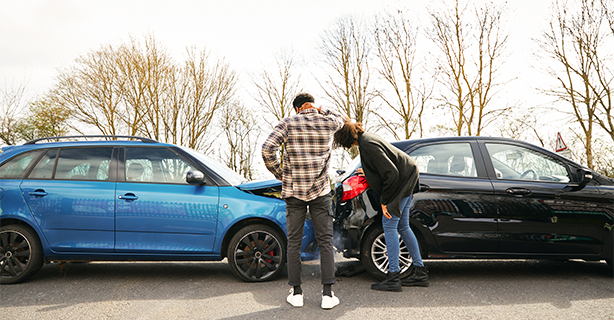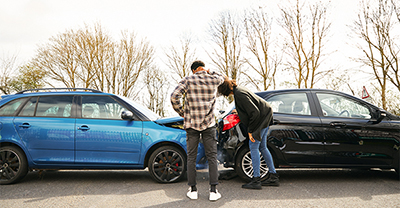Will my car insurance rates increase after an accident?


0 min. read
After an accident, concerns about car repairs and injuries are often paired with worries about rising insurance costs. While it's true an accident may affect your premiums, the exact amount depends on several factors. Let’s review these factors to help you better understand how accidents can affect insurance rates and what steps you can take to help minimize the impact.
Fault vs. no fault
Determining responsibility: Were you responsible for the accident, or were you the victim of someone else's mistake? The distinction between fault and no fault plays a crucial role in insurance premium adjustments.
Impact of fault: If you're deemed at fault for an accident, there's a higher likelihood of a premium increase. Insurance companies may perceive you as a higher risk and adjust your rates accordingly.
Non-fault incidents: Accidents where you aren’t at fault, such as confirmed hit-and-run incidents, could still affect premiums, although the increase may be less significant. Therefore, providing your insurer with detailed accident information is essential for accurate assessment.
Accident severity
Extent of damage and injuries: Whether it's a minor fender bender or a major collision, the severity of an accident can significantly influence its impact on your insurance premiums.
Impact on premiums: While minor accidents typically result in smaller premium increases and major ones in higher increases, the exact effect depends on several factors such as severity, fault percentage, accident history, and policy details. Moreover, chargeability rules and thresholds vary significantly by state and insurance company.
Assessing risk: Insurance providers evaluate the severity of accidents to gauge the associated risk and potential payouts. Alongside accident history, including fault or not-at-fault incidents, factors like driving record, age, location, and coverage type also contribute to premium adjustments. Additionally, fault-based systems and their implications on premiums vary across states.
Driving history
Clean record benefits: A clean driving record, devoid of previous accidents or violations, can help mitigate the impact of the current accident on your premium.
Risk assessment: However, a history of speeding tickets, reckless driving, or other violations suggests riskier behavior, potentially leading to higher premium increases.
Claim history impact: Additionally, past insurance claims can influence your insurer's risk assessment and may impact your premium following a new accident.

5 tips to help minimize rate increases
While insurance rate increases after accidents are often unavoidable, you can take several proactive steps to help minimize the impact:
1. Raise your deductible:
Opting for $1,000 deductibles requires more out-of-pocket expenses per claim but can help offset a rate increase. Weigh the potential savings against your ability to cover the higher deductible in case of future accidents.
2. Maintain a clean driving record:
Adhere to safe driving practices, avoiding traffic violations and accidents after your claim. Demonstrate responsible behavior with defensive driving habits to help lower your risk of incidents and potentially reduce future rate adjustments with your insurer.
3. Qualify for auto insurance discounts.
Most auto insurance companies offer a range of discounts to help you save money. You may be surprised how many you qualify for. In fact, something as simple as having multiple vehicles on the same policy could earn you a discount.
4. Carry only your state minimum coverage requirements.
Having fewer coverages and lower limits on your policy provides less protection than “full coverage” auto insurance—potentially leaving you vulnerable to higher out-of-pocket costs following an accident—but it can also help keep your monthly payments lower.
5. Shop around for quotes:
Just like you would for any major purchase, make sure you do your research, ask questions, and repeatedly evaluate the cost of your policy.
We understand your concerns surrounding car insurance costs after an accident. If you have questions about your Dairyland® car insurance policy, our knowledgeable customer service representatives can help. Call 866-448-0872 for assistance.
Why choose Dairyland insurance after an accident?
As a brand of the Sentry Insurance Group, Dairyland has built a strong reputation with over five decades of understanding and supporting drivers. If you’re shopping around, here’s why you should consider us:
Flexible, tailored coverage options. Some liability limits, deductibles, and optional protections can be adjusted to build a policy that fits your budget. Our agents will help you find the right balance of affordability and protection.
Specialized discounts: Dairyland provides auto insurance discounts, like a homeowners discount, multi-vehicle discounts, defensive driver course discounts, and reduced rates for transferring from another provider to Dairyland.
Around-the-clock claims support: Our experienced claims team is available to guide you through the process after an accident and help ensure you get timely support and a fair settlement. We make the claims process smooth and stress-free as it can be.
Reliable customer service: We pride ourselves on providing prompt, reliable customer service. Our U.S.-based representatives are experienced with addressing questions and concerns from high-risk drivers before and after accidents.

Frequently asked questions about auto insurance rates
What should I do after a car accident?
Knowing the right steps to take after an accident can help you minimize stress and ensure a smooth resolution. Here's what to do:
Stop promptly. Check for injuries and call 911 if needed.
Document the scene. Photos, videos, and notes are crucial.
Gather information. Exchange details with the other driver and witnesses.
File a police report. Create an official record of the incident.
Contact your insurance company. Report the claim and provide details.
Keep a record of everything. Save paperwork, bills, and communication.
How does an accident affect premiums during the first policy term?
Most insurers can’t raise your rate mid-term after an accident, even if you’re at fault. However, they can choose not to renew the policy. Any rate increase may show up upon renewal.
Can an accident lead to increased rates, even if I wasn’t at fault?
Possibly—this depends on several factors, including the specifics of the accident and your state’s laws regarding fault.
With some knowledge about how car insurance rates are determined, you can better understand costs and stay protected on the road. Careful budgeting and shopping around helps you manage the expense while maintaining essential coverage.
Can I get insurance again if my policy lapses after a rate increase?
Yes. However, not having auto insurance for any period of time can make your next policy more expensive. This is largely due to the fact that most auto insurance providers view drivers with inconsistent coverage as high-risk—and more expensive to insure. Look for a non-standard auto insurance provider that specializes in high-risk drivers.
The general information in this blog is for informational or entertainment purposes only. View our blog disclaimer.
*Data accuracy is subject to this article's publication date.










